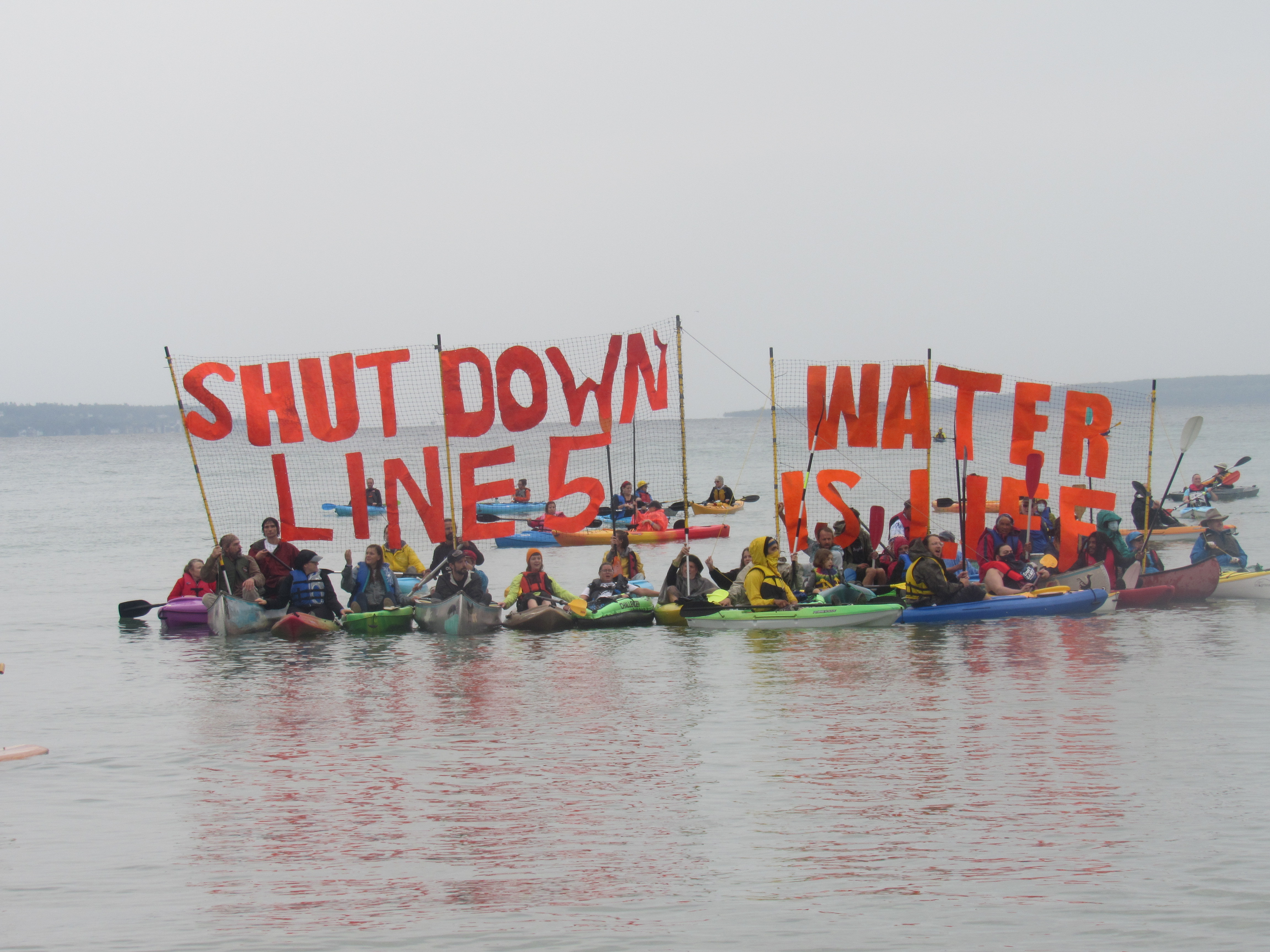
- Details
- By Native News Online Staff
Thirty Great Lakes region tribal leaders are pressuring President Joe Biden to speak out against the dangerous Enbridge Line 5 pipeline’s trespass on the Bad River Tribe’s land in northern Wisconsin.
The tribal leaders representing 30 tribal nations sent a letter to the president on Tuesday, Feb. 27, 2024. Copied on the letter were Interior Secretary Deb Haaland (Laguna Pueblo) and U.S. Secretary of State Anthony Blinken.
The tribal leaders’ letter presses the U.S. government to weigh in: The Bad River Band should not be left to wage an existential fight against Enbridge and Canada while its trustee and treaty partner, the United States, remains on the sidelines.
A federal district court last June found that Enbridge has been knowingly trespassing on the Bad River Reservation since 2013 and ordered them to stop operating Line 5 on tribal land by 2026.
Enbridge appealed the case to the Seventh Circuit Court of Appeals, arguing that they should be allowed to trespass indefinitely. The court requested federal input in December 2023, but the Biden Administration has not responded. At the oral argument held before a Seventh Circuit panel on February 8, Judge Frank Easterbrook called the United States’ silence “extraordinary.”
"When a foreign corporation seeks to disregard U.S. property laws and threatens tribal sovereignty and the rights of Indigenous citizens of the United States, the federal government has an obligation to push back against that incursion," Bay Mills Indian Community President Whitney Gravelle said. "We request that President Biden acts quickly to support, not just the right of Tribal Nations to protect their lands and people, but also the rule of law."
Line 5 transports up to 23 million gallons of crude oil and natural gas liquids daily from western to eastern Canada, cutting across the treaty-reserved territory of tribal nations including the Bad River Band in Wisconsin and the Bay Mills Indian Community in Michigan. Since 2013, Enbridge has earned over $1 billion by trespassing on the Bad River Band’s reservation, where there are only 11 feet of bank remaining between the pipeline and the current of the Bad River at its narrowest point.
"A pipeline company’s control of the Bad River would devastate our seasonal fisheries, the resources necessary for the wild rice life cycle, and the flood protection safety the River plain provides. It has not been easy fighting a multi-national corporation and the Government of Canada for our right to protect our homeland, but thankfully we have not been alone. Our sister tribes as well as the State of Michigan have spoken up to defend the sovereign right of tribes and states to safeguard their homelands and the reasons we live here, and against flagrant trespass and environmental disaster at the Straits. It is time for the Biden Administration to step up to protect our reservation and watershed for the benefit of all," Bad River Tribal Chairman Robert Blanchard said.
Studies and analysis by Enbridge’s own experts reveal that Line 5 can be shut down with almost no impact on fuel supplies or gas prices. Even so, the government of Canada officially has weighed in on the side of Enbridge, while the U.S. government has been mute.
The letter, signed by 30 Tribal Nations in the Great Lakes regions, explains: "[M]any Tribal Nations, like the Bad River Band, have entered into treaties with the United States guaranteeing them permanent homelands and reserving for them the right to exclude non-Indians from their homelands. These treaties are the supreme law of the land. One aspect of the inherent sovereign authority that Tribal Nations have retained is their absolute right and power to exclude non-Indians from, condition non-Indians’ entry on, and expel trespassing non-Indians from tribal lands. This right is a core aspect of tribal sovereignty and has been repeatedly affirmed by the United States Supreme Court for over two centuries."
Read the full letter here: https://narf.org/wordpress/wp-content/uploads/2024/02/20240227line5-tribal-biden-letter.pdf
More Stories Like This
Gwich'in Tribal Governments Submit Comments Challenging Fish and Wildlife Service's Inadequate Environmental Review of Arctic Refuge Snow RoadRappahannock Tribe Challenges 9M-Gallon Water Plan
Feds release draft long-term plans for Colorado River management
Apache Leader Walks 60 Miles to Court Hearing That Will Decide Fate of Sacred Oak Flat
Rappahannock Tribe Raises Sovereignty and Environmental Concerns Over Caroline County Water Permit
Help us defend tribal sovereignty.
At Native News Online, our mission is rooted in telling the stories that strengthen sovereignty and uplift Indigenous voices — not just at year’s end, but every single day.
Because of your generosity last year, we were able to keep our reporters on the ground in tribal communities, at national gatherings and in the halls of Congress — covering the issues that matter most to Indian Country: sovereignty, culture, education, health and economic opportunity.
That support sustained us through a tough year in 2025. Now, as we look to the year ahead, we need your help right now to ensure warrior journalism remains strong — reporting that defends tribal sovereignty, amplifies Native truth, and holds power accountable.
 The stakes couldn't be higher. Your support keeps Native voices heard, Native stories told and Native sovereignty defended.
The stakes couldn't be higher. Your support keeps Native voices heard, Native stories told and Native sovereignty defended.
Stand with Warrior Journalism today.
Levi Rickert (Potawatomi), Editor & Publisher

